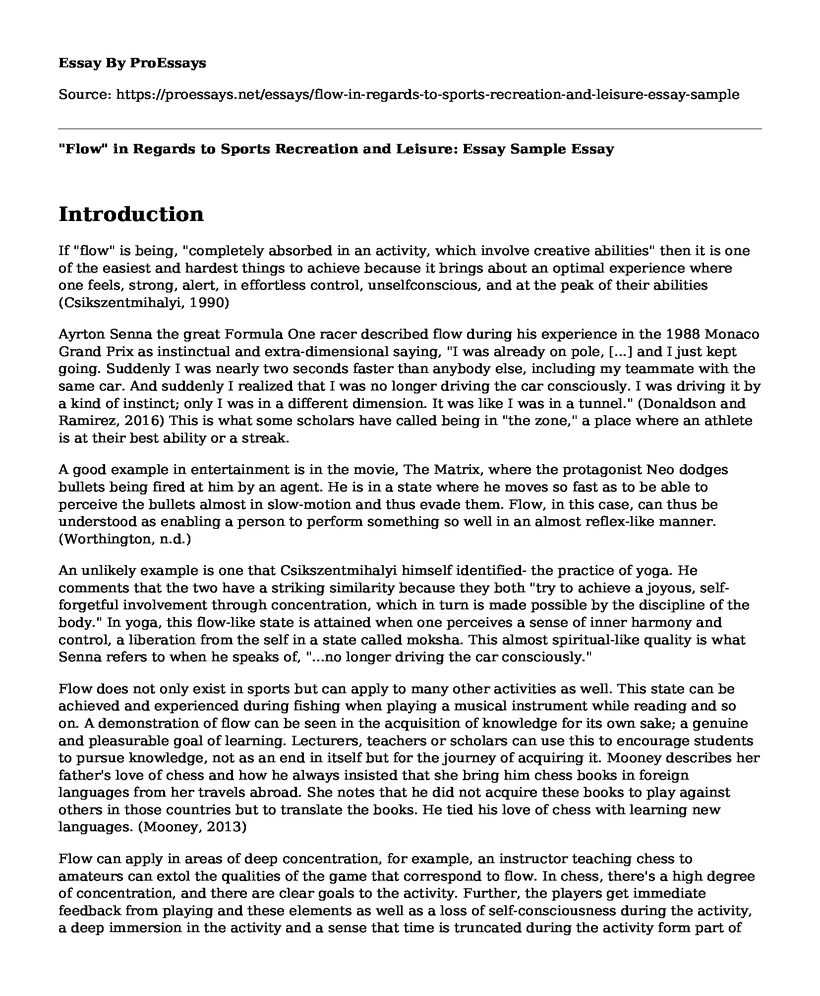Introduction
If "flow" is being, "completely absorbed in an activity, which involve creative abilities" then it is one of the easiest and hardest things to achieve because it brings about an optimal experience where one feels, strong, alert, in effortless control, unselfconscious, and at the peak of their abilities (Csikszentmihalyi, 1990)
Ayrton Senna the great Formula One racer described flow during his experience in the 1988 Monaco Grand Prix as instinctual and extra-dimensional saying, "I was already on pole, [...] and I just kept going. Suddenly I was nearly two seconds faster than anybody else, including my teammate with the same car. And suddenly I realized that I was no longer driving the car consciously. I was driving it by a kind of instinct; only I was in a different dimension. It was like I was in a tunnel." (Donaldson and Ramirez, 2016) This is what some scholars have called being in "the zone," a place where an athlete is at their best ability or a streak.
A good example in entertainment is in the movie, The Matrix, where the protagonist Neo dodges bullets being fired at him by an agent. He is in a state where he moves so fast as to be able to perceive the bullets almost in slow-motion and thus evade them. Flow, in this case, can thus be understood as enabling a person to perform something so well in an almost reflex-like manner. (Worthington, n.d.)
An unlikely example is one that Csikszentmihalyi himself identified- the practice of yoga. He comments that the two have a striking similarity because they both "try to achieve a joyous, self-forgetful involvement through concentration, which in turn is made possible by the discipline of the body." In yoga, this flow-like state is attained when one perceives a sense of inner harmony and control, a liberation from the self in a state called moksha. This almost spiritual-like quality is what Senna refers to when he speaks of, "...no longer driving the car consciously."
Flow does not only exist in sports but can apply to many other activities as well. This state can be achieved and experienced during fishing when playing a musical instrument while reading and so on. A demonstration of flow can be seen in the acquisition of knowledge for its own sake; a genuine and pleasurable goal of learning. Lecturers, teachers or scholars can use this to encourage students to pursue knowledge, not as an end in itself but for the journey of acquiring it. Mooney describes her father's love of chess and how he always insisted that she bring him chess books in foreign languages from her travels abroad. She notes that he did not acquire these books to play against others in those countries but to translate the books. He tied his love of chess with learning new languages. (Mooney, 2013)
Flow can apply in areas of deep concentration, for example, an instructor teaching chess to amateurs can extol the qualities of the game that correspond to flow. In chess, there's a high degree of concentration, and there are clear goals to the activity. Further, the players get immediate feedback from playing and these elements as well as a loss of self-consciousness during the activity, a deep immersion in the activity and a sense that time is truncated during the activity form part of an eight-point criteria that Robert Stebbins shows meets Csikszentmihalyi' concept of flow. The instructor would then go on to encourage players to aspire to achieve flow, where the game becomes almost instinctual, and the deepest satisfaction emanates.
Conclusion
Flow is not foreign to vocations either. It can be experienced when one "let's go" while engaging in the activity, reacting spontaneously and with a child-like intensity. Because the actions of the engagement are accomplished without any conscious ulterior motive, the performer can achieve a state where every action, be it a slice of a knife for a butcher or keystrokes for a typist, is done with ease in an almost smooth dance full of perception and understanding. (Hickey, 2011)
References
Csikszentmihalyi, Mihaly (1990). Flow: The Psychology of Optimal Experience. New York, NY: Harper and Row.
Donaldson, G., & Ramirez, J. (2016, May 28). Ayrton Senna talks about his epic lap at Monaco. Retrieved from http://www.f1speedwriter.com/2012/05/ayrton-senna-at-Monaco-1988.html
Hickey, L. P. (2011, November 17). 'Flow' Experiences: The Secret to Ultimate Happiness? Retrieved from https://www.huffingtonpost.com/lance-p-hickey-phd/flow-experiences-happiness_b_811682.html
Mihaly Csikszentmihalyi. (n.d.). Retrieved March 22, 2018, from http://www.pursuit-of-happiness.org/history-of-happiness/mihaly-csikszentmihalyi/
Mooney, M. (2013, June 5). Flow: Let's Get Serious about Leisure. Retrieved from http://www.patheos.com/blogs/blackwhiteandgray/2013/06/flow-lets-get-serious-about-leisure/
Stebbins, R. A. (2010). Flow in serious leisure: Nature and prevalence. Leisure Studies Association Newsletter, 87, 21-23.
Worthington, V. (n.d.). Being In the Zone: The Flow State in Athletic Endeavors. Retrieved from https://breakingmuscle.com/fitness/being-in-the-zone-the-flow-state-in-athletic-endeavors
Cite this page
"Flow" in Regards to Sports Recreation and Leisure: Essay Sample. (2022, Apr 04). Retrieved from https://proessays.net/essays/flow-in-regards-to-sports-recreation-and-leisure-essay-sample
If you are the original author of this essay and no longer wish to have it published on the ProEssays website, please click below to request its removal:
- Should College Football Athletes Be Paid?
- Article Review 'Athletes and Herbal Supplements'
- General Fitness: Physical Activity and Psychological Well-Being Annotated Bibliography
- Essay Sample on U.S. Military Fitness Decline: Poor Recruitment, Lifestyle & Mental Health
- Essay on Footballers and Cancer: Heroes Defying the Odds
- Achieving Physical Literacy: The Fifth Standard of Physical Education - Essay Example
- Free Essay Sample on 20th Century American Leisure: Parks, Gyms, & Sports







